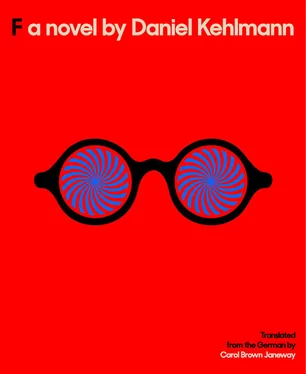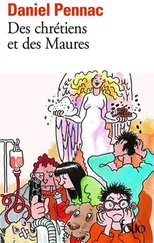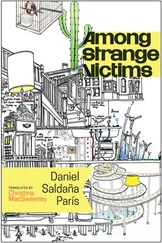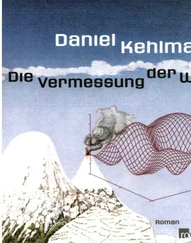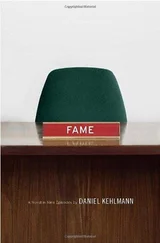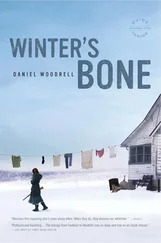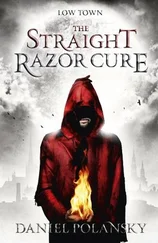His father too was a farmer. He never left his landholding. Occasionally people passed by who came from other places and were heading for still other places. He wanted none of it.
His father too was a farmer. He never left his landholding, and he didn’t understand why people got on the road, as if trees, hills, and lakes weren’t the same everywhere. He tilled his fields, made sure he never saw his sisters, died young, and never came back.

His father too was a farmer. He never left his landholding and had many children. Two of them came into the world in one go — they were girls, and they resembled each other so exactly that they seemed to be one and the same person. The work of the devil, he cried. Even the priest said there was no good explanation for it, and his wife called on the grace of God. But he couldn’t bring himself to drown them. So the girls grew up and married farmers in the village nearby. He gave them generous dowries. Their children looked nothing like one another.
His father was a traveler, a magus, a puller of teeth, and a con man. He had fled the plague, and in Cologne he had taken flight before a huge crowd and soared three times around the as-yet-unfinished cathedral. Later people told all kinds of stories about how he’d faked it, but in reality flying isn’t hard, provided you are devoid of either scruples or fears, and you’re crazy besides. Somewhere near Ulm he was accused by a merchant of having stolen money, which was true, but he also knew you just had to be able to run faster than the idiots on your tail, and nobody would be able to threaten you. In a village under particularly high trees he fathered a child. He never saw it, but then he’d never known his own father either.
And so his days passed. Some said he had been killed in Palestine, others that he had ended on the gallows. Only a handful later asserted that he was still alive, for you could kill almost anyone, but not someone like him.
His father was the son of a mercenary who had overcome an unwilling woman by the side of the road as they campaigned. As he held her, she understood that God would not help her, because hell was no future thing, hell was now and hell was here. Suddenly the mercenary realized that things were wrong, and he let her go, but it was already too late, and he ran away and forgot. She abandoned the child in the stable as soon as it was born, and she forgot it too.
But the boy survived. He survived the miasma of the plague that swept through the land, he survived pain, he survived typhus, he did not want to die, even when nothing held out the promise of life, and there was almost nothing to eat; he survived even when there was nothing but vomit and flies, he survived, and if he hadn’t, I would not exist and nor would my sons. There would be others in our place, others who regarded their existence as inevitable.
He grew up, became a blacksmith, found a wife, started a little business that was soon destroyed by fire, then became a groom. He sired eight children, three of whom survived. Soon thereafter he was run over by a wagon, lost a leg, but didn’t die, although the gangrene also affected his brain. He dreamed that the devil came to him, and he asked the devil for a long life; the devil went back to hell, and soon after that the fever broke.
One morning, weeks or perhaps years later, he woke up with confused memories of cards, wine, and open knives. He didn’t retain many memories of the night before, the world seemed somehow smaller, something was missing, and as he reached up past his nose, following the path of the pain, he realized that an eye was missing. At first for a brief moment he was shocked, but then he laughed. What a good accident it was that that was all that happened to him, and nothing worse, for men had two eyes. Only one heart, one stomach, but two eyes! Life was hard, but sometimes fate was kind.
I’ve already been hearing the sobbing for some time. At first it was a sound in my dream, but now the dream is over and the sobbing is coming from the woman next to me. Eyes closed, I know that the voice is Laura’s, or, rather, that suddenly it’s been hers all along. She’s crying so hard that the mattress is shaking. I lie there motionless. How long can I pretend I’m asleep? I would love to give up and sink back into unconsciousness, but I can’t. The day has begun. I open my eyes.
The morning sun pushes through the slats of the blinds and draws fine lines in both carpet and wall. The pattern on the carpet is symmetrical, but if you look at it for a long time, it captures your attention, gripping it until you can’t shake free. Laura is lying next to me in perfect peace, breathing silently, sound asleep. I push back the blanket and get up.
As I’m groping my way down the hall, the memory of the dream returns. No doubt about it, it was my grandmother. She looked tired, worn out, and somehow not complete, as if only a portion of her soul had managed to force its way through to me. She stood in front of me, bent over, leaning on a walking stick, with two ballpoint pens sticking out of her bun. She opened and closed her mouth and made signs with her hands; she was determined to tell me something. She looked unutterably weary, lips pursed, eyes pleading, until in the next moment some change in the dream washed her away and I was somewhere else, surrounded by other things. I will never know what she wanted to tell me.
I shave, get into the shower, and turn on the hot tap. The water is warm, then hot, then very hot, which is how I like it. I tip my head back and let the water beat down on me, listen to the noise, feel the pain, and forget absolutely everything for a moment.
It doesn’t last long. Already the memory comes crashing back like a wave. Perhaps I can hold out for another couple of months, maybe even three, but not longer.
I turn off the water, get out of the shower, and push my face into the terrycloth of the bath towel. As always, my memory reacts to the smell, calling up images: Mama taking me to bed wrapped in a towel, Papa’s tall figure outlined by the ceiling light, his tousled hair in silhouette, Ivan already asleep in the other bed, our sandbox where I always knocked over the towers he built, a meadow, a worm he found that I split in half, and he cried and cried. Or was it the other way around? I put on my bathrobe. Now I need my medication.
In my study everything is normal. This calms me. The desk with its big screen, the Paul Klee on one wall and the Eulenboeck on the other, the empty files. I have never worked here. Even the drawers are empty and not one of the reference books has ever been opened. But when I sit here and pretend to be lost in thought, no one comes in, and that counts for something in and of itself.
Two Throprens, a Torbit, a Prevoxal, and a Valium — I can’t begin the day with too much, because I have to be able to up the dose if something unforeseen occurs. I swallow them all in one gulp; it’s unpleasant and I have to use all my willpower to conquer the gag reflex. Why I always take them without water, I have no idea.
Already I can feel them working. It’s probably my imagination, nothing could work that fast, but is that important? Indifference settles over me like cotton wool. Life goes on. One day you’ll lose it all, the name Eric Friedland will be abhorred, those who still trust you will curse you, your family will fall apart, and they’ll lock you up. But not today.
I’ll never be able to tell anyone how much I hate this Paul Klee. Lopsided diamonds, red on a black background, and next to them a wind-blown, truly pitiful little matchstick man. Even I could have painted it. I know I’m not supposed to even think such a sentence, it is utterly forbidden, but I can’t help it, even I could have painted it, it would have taken me less than five minutes! Instead of which I paid seven hundred and fifty thousand euros for it, but a man in my position must possess a very expensive painting: Janke has a Kandinsky, Nettelback of BMW has a Monet — maybe it’s a Manet, what do I know? — and old Rebke, my golf partner, has a Richard Serra on the lawn, huge, rusty, and always in the way at garden parties. So I asked Ivan two years ago to get me a picture too, it just had to be something that was a sure thing.
Читать дальше
